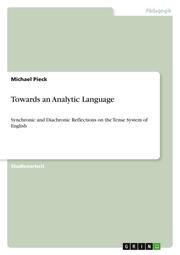Detailansicht
Towards an Analytic Language
Synchronic and Diachronic Reflections on the Tense System of English
ISBN/EAN: 9783640909254
Umbreit-Nr.: 3702893
Sprache:
Deutsch
Umfang: 28 S.
Format in cm: 0.3 x 21 x 14.8
Einband:
kartoniertes Buch
Erschienen am 25.05.2012
Auflage: 2/2012
€ 17,95
(inklusive MwSt.)
Lieferbar innerhalb 1 - 2 Wochen
